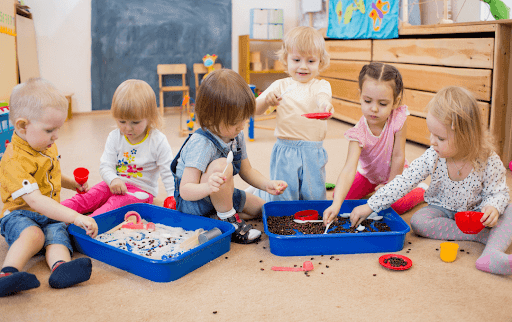
Social and emotional skills are essential for children’s overall development and success in life. These skills help children build healthy relationships, regulate their emotions, and communicate effectively. As parents, caregivers, and educators, we play a crucial role in promoting the development of social and emotional skills in children.
Here are some effective ways to promote the development of social and emotional skills in children:
Encourage Positive Relationships
 Encouraging positive relationships is a vital aspect of promoting the social and emotional development of children. Positive relationships with peers, family, and friends play a crucial role in shaping a child’s overall well-being and happiness. As parents, caregivers, and educators, it is essential to encourage children to build these relationships from an early age.
Encouraging positive relationships is a vital aspect of promoting the social and emotional development of children. Positive relationships with peers, family, and friends play a crucial role in shaping a child’s overall well-being and happiness. As parents, caregivers, and educators, it is essential to encourage children to build these relationships from an early age.
Effective communication is the foundation of positive relationships. Teaching children how to communicate effectively is essential in promoting social and emotional development. This includes teaching them how to listen actively, express themselves clearly, and understand others’ perspectives. Encouraging children to share their thoughts and feelings can also help them build trust and strengthen their relationships.
Conflicts are a natural part of any relationship, and it is important to teach children how to resolve them peacefully. Teaching conflict resolution skills can help children learn how to navigate challenging situations and build stronger relationships. It is essential to teach them how to express their feelings calmly and respectfully, listen to others’ perspectives, and find mutually agreeable solutions.
Creating opportunities for children to socialize and engage with others is also critical in promoting positive relationships. Playdates, team sports, and after-school clubs are excellent ways to encourage children to socialize and interact with their peers. These activities can help children learn how to work as a team, build their social skills, and develop new friendships.
Promote Self-Awareness
 Promoting self-awareness in children is another crucial aspect of their social and emotional development. Self-awareness helps children understand their emotions, thoughts, and values, which is essential in regulating their emotions and making better decisions. Building self-awareness can also help children develop a positive self-image and build their self-esteem.
Promoting self-awareness in children is another crucial aspect of their social and emotional development. Self-awareness helps children understand their emotions, thoughts, and values, which is essential in regulating their emotions and making better decisions. Building self-awareness can also help children develop a positive self-image and build their self-esteem.
Encouraging children to reflect on their feelings, thoughts, and behaviours is an excellent way to promote self-awareness. Asking children to describe how they feel and why they feel that way can help them identify their emotions and understand the triggers that cause them. This understanding can help children learn to regulate their emotions effectively and cope with challenging situations.
Identifying strengths, weaknesses, and values is another essential aspect of promoting self-awareness in children. Identifying their strengths can help children develop a positive self-image and build their confidence. Identifying their weaknesses can help children learn to recognize areas where they need to improve and develop a growth mindset. Understanding their values can help children make decisions that align with their beliefs and develop a sense of purpose and direction.
Encouraging children to explore their interests and passions can also help promote self-awareness. This can help children identify what they enjoy and what they are good at, leading to a greater sense of self-awareness and self-confidence.
Teach Empathy
 Empathy allows children to understand and share the feelings of others, which is essential in building positive relationships, resolving conflicts, and communicating effectively.
Empathy allows children to understand and share the feelings of others, which is essential in building positive relationships, resolving conflicts, and communicating effectively.
Encouraging children to listen actively is a great way to promote empathy. Listening actively means paying attention to what the other person is saying without interrupting or judging them. It helps children understand the other person’s perspective and feelings, which is crucial in developing empathy.
Showing understanding and compassion towards others is also essential in promoting empathy. Encourage children to put themselves in the other person’s shoes and imagine how they would feel in that situation. This can help children develop a deeper understanding of other people’s emotions and feelings, leading to greater empathy.
Asking children to imagine how others feel in different situations and how they can help is another excellent way to promote empathy. Encourage children to think about how they can make a difference in someone else’s life, no matter how small the action may seem. This can help children develop a sense of responsibility and compassion towards others, leading to greater empathy.
Teaching children to express their own emotions and feelings is also crucial in promoting empathy. When children can express themselves effectively, they are better able to understand and empathise with others’ emotions and feelings.
Develop Problem-Solving Skills
 Problem-solving skills enable children to navigate difficult situations, make informed decisions, and cope with challenges and setbacks effectively.
Problem-solving skills enable children to navigate difficult situations, make informed decisions, and cope with challenges and setbacks effectively.
Encouraging children to identify problems is the first step in developing problem-solving skills. Encourage them to identify the problems they face in their daily lives and think about how they can solve them. This can help children develop a proactive mindset and learn to take responsibility for their actions.
Brainstorming solutions is the next step in developing problem-solving skills. Encourage children to think creatively and come up with multiple solutions to a problem. This can help children develop a growth mindset and learn to approach problems from different angles.
Teaching children to evaluate outcomes is also crucial in developing problem-solving skills. Encourage them to think about the consequences of their actions and evaluate the effectiveness of their solutions. This can help children develop a sense of responsibility and accountability and learn from their mistakes.
It is crucial to teach children to consider different perspectives when developing problem-solving skills. Encourage them to think about how others may perceive a problem and consider the impact of their actions on others. This can help children develop empathy and learn to approach problems with a more holistic perspective.
Helping children develop coping strategies and resilience is also essential in developing problem-solving skills. Encourage them to stay positive, take care of themselves, and seek support when needed. This can help children develop a sense of resilience and learn to bounce back from setbacks.
Foster Positive Self-Talk
 Positive self-talk is the inner voice that helps children regulate their emotions, build self-esteem, and develop a growth mindset.
Positive self-talk is the inner voice that helps children regulate their emotions, build self-esteem, and develop a growth mindset.
Encouraging children to use positive self-talk is an excellent way to promote positive thinking. Teach children to use phrases such as “I can do this” or “I am strong” to help them build self-confidence and self-esteem. This can help children develop a positive self-image and a sense of self-worth.
Teaching children to challenge negative self-talk is also crucial in fostering positive self-talk. Encourage them to question negative thoughts such as “I am not good enough” or “I can’t do it” and replace them with positive ones. This can help children develop a growth mindset and learn to approach challenges with a more positive attitude.
Helping children develop a positive attitude towards themselves and others is also essential in fostering positive self-talk. Encourage them to focus on their strengths and positive qualities, and to recognise and celebrate the strengths of others. This can help children develop a sense of empathy and compassion towards others, leading to positive relationships.
Fostering positive self-talk also relies on teaching children to identify and regulate their emotions effectively. Encourage them to identify their emotions and think about how they can manage them effectively. This can help children learn to regulate their emotions and build resilience.
Conclusion
In conclusion, promoting the development of social and emotional skills in children is crucial for their overall well-being and success in life.
As parents, caregivers, and educators, we can encourage positive relationships, promote self-awareness, teach empathy, develop problem-solving skills, and foster positive self-talk. By doing so, we can help children become confident, resilient, and empathetic individuals who can thrive in a rapidly changing world.
FREQUENTLY ASKED QUESTIONS
Q: Why is promoting the development of social and emotional skills in children important?
A: Promoting the development of social and emotional skills in children is essential because these skills help children build healthy relationships, regulate their emotions, and communicate effectively. These skills are crucial for children’s overall well-being and success in life.
Q: How can parents, caregivers, and educators promote the development of social and emotional skills in children?
A: Parents, caregivers, and educators can promote the development of social and emotional skills in children by encouraging positive relationships, promoting self-awareness, teaching empathy, developing problem-solving skills, and fostering positive self-talk. These strategies can help children become confident, resilient, and empathetic individuals who can thrive in a rapidly changing world.
Q: What are some effective ways to encourage positive relationships in children?
A: Encouraging positive relationships in children can be done by teaching effective communication, promoting conflict resolution skills, and creating opportunities for socialization and engagement with peers, family, and friends. Playdates, team sports, and after-school clubs are excellent ways to encourage children to socialize and interact with others.
Q: How can parents, caregivers, and educators promote self-awareness in children?
A: Parents, caregivers, and educators can promote self-awareness in children by encouraging reflection on feelings, thoughts, and behaviours, asking them to describe how they feel and why, helping them identify their strengths, weaknesses, and values, and encouraging exploration of interests and passions.
Q: What is empathy, and why is it important to teach children empathy?
A: Empathy is the ability to understand and share the feelings of others. It is essential to teach children empathy because it helps them develop positive relationships, resolve conflicts, and communicate effectively. Teaching empathy can also help children develop compassion and understanding towards others, leading to a more harmonious and inclusive society.
Q: How can parents, caregivers, and educators teach children problem-solving skills?
A: Parents, caregivers, and educators can teach children problem-solving skills by encouraging them to identify problems, brainstorm solutions, evaluate outcomes, consider different perspectives, and develop coping strategies and resilience to deal with challenges and setbacks.
Q: What is positive self-talk, and why is it important to foster positive self-talk in children?
A: Positive self-talk is the inner voice that helps children regulate their emotions, build self-esteem, and develop a growth mindset. It is essential to foster positive self-talk in children because it can help them develop a positive self-image, learn to challenge negative thoughts, and develop a positive attitude towards themselves and others. This can lead to greater confidence, resilience, and success in life.




Promoting the Development of Social and Emotional Skills in Children